Signs Of Worms in Cats, Types, Causes and Treatment

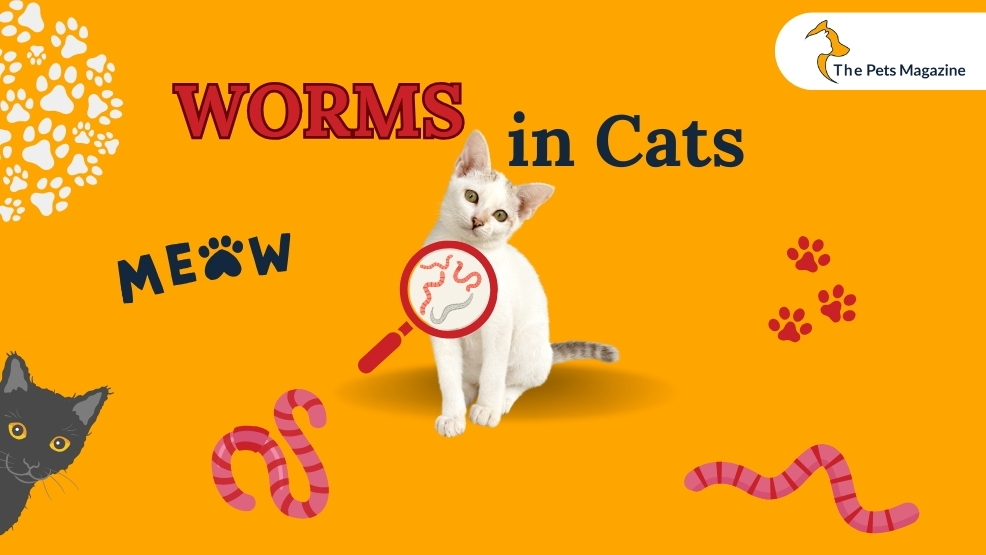
Worms? In my CAT? That is the shortest one-line horror story for any cat parent. And for good reason, too. Because those tiny, pesky parasites can turn your happy, cuddly kitty into a dull-coated, miserable animal. Sounds horrible, right?
This is why you need to know the signs of worms in cats so that you can take proactive steps as soon as you spot even one. In this article, we’ll dive into the telltale signs of worms in cats, explore the different types, uncover the causes, and, most importantly, discuss effective treatments. So, let’s get started!
Common Types of Worms in Cats
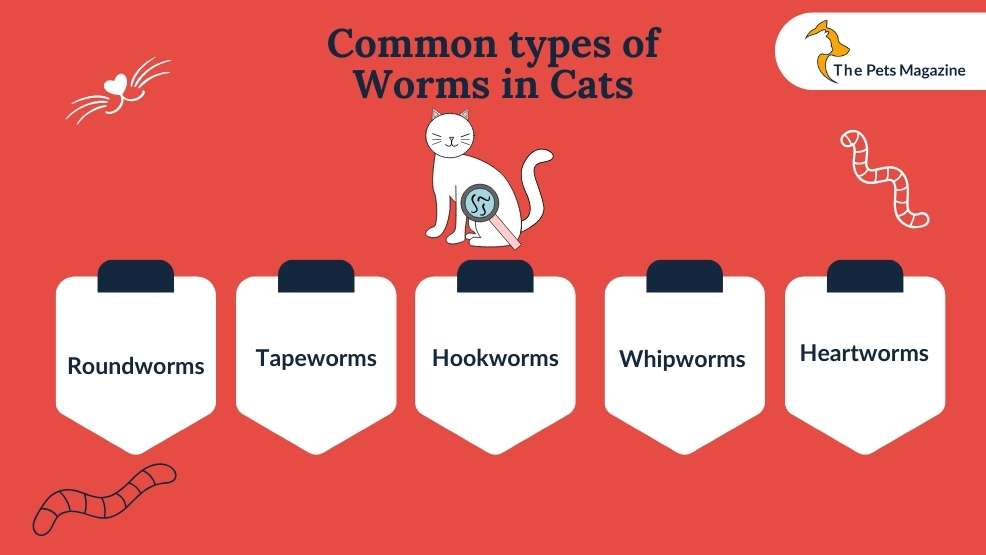
You should know that worm infestation is quite a common issue among cats, particularly those that spend a lot of time outdoors or have access to prey on animals. These parasites can contact your cat’s body through various routes. This includes ingesting infected rodents, consuming contaminated soil or water, or even through direct contact with other infected animals.
While some worms may cause minimal discomfort, others can lead to more severe consequences, making early detection and treatment crucial.
Here are some of the most common worm infestations found in felines:
Roundworms
These spaghetti-like parasites are among the most prevalent worms in cats, particularly in kittens. They can cause digestive issues, weight loss, and a potbellied appearance.
Tapeworms
Resembling flat, segmented ribbons, cats can contract tapeworms if they ingest infected fleas or rodents. These worms can then cause digestive problems and anal irritation.
Hookworms
These small, hook-shaped worms attach to the intestinal lining, causing blood loss, anemia, and diarrhea.
Whipworms
As the name suggests, these whip-like worms inhabit the large intestine and can cause weight loss, diarrhea, and dehydration in cats.
Heartworms
While primarily affecting dogs, cats can also contract heartworms, leading to severe respiratory issues and even heart failure if left untreated. Some of the signs of heartworms in cats include coughing, vomiting, decreased appetite, lethargy and more.
It is crucial to Understand the different types of worms and how they may affect your cat’s health. This will enable you to begin prompt and appropriate treatment for your cat.
What Are Signs of Worms in Cats?
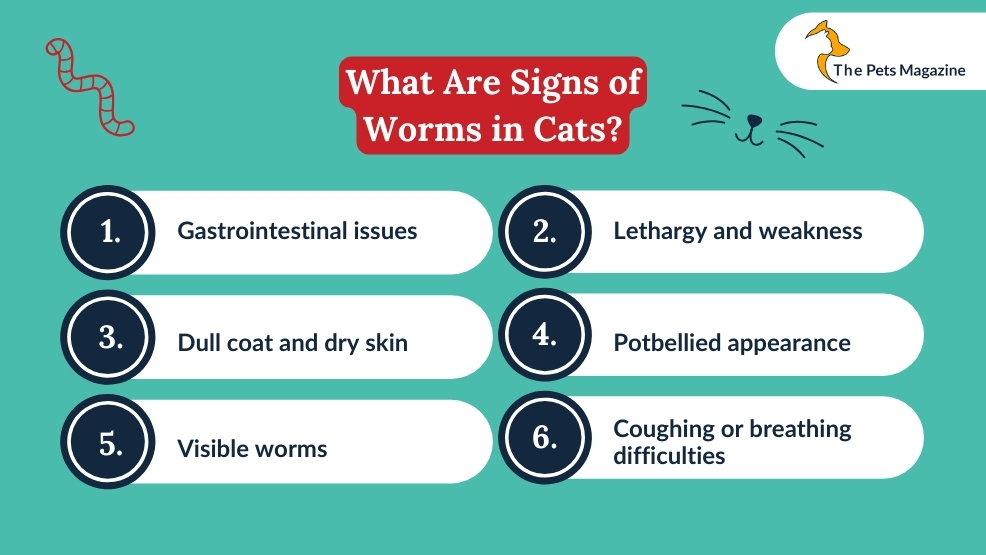
Identifying the signs of worms in cats can be challenging, as some symptoms may be subtle or mimic other health issues. However, awareness of the common indicators can aid in early detection and timely intervention. Here are some telltale signs that will help you to know if your cat is sick:
Gastrointestinal issues: Worms can cause digestive disturbances such as diarrhea, constipation, abdominal discomfort or vomiting in cats. A loss of appetite or weight loss may accompany these symptoms.
Lethargy and weakness: Infestations can drain your cat’s energy, leading to lethargy, weakness, and a general lack of enthusiasm for activities they once enjoyed.
Dull coat and dry skin: Worms can rob your cat of essential nutrients, resulting in a dull, unkempt coat and dry, flaky skin.
Potbellied appearance: Certain worms, such as roundworms, can cause a distended or potbellied appearance, especially in kittens.
Visible worms: In some cases, you may be able to spot worms in your cat’s feces, around the anus, or even in vomit. This is a clear indication of an infestation.
Coughing or breathing difficulties: In the case of heartworm infestations, you may notice respiratory issues like your cat coughing, wheezing, or labored breathing.
It’s important to note that some of these signs can also indicate other health issues, so consulting with your veterinarian is crucial for an accurate diagnosis and appropriate treatment plan.
How to Diagnose Worms in Cats?
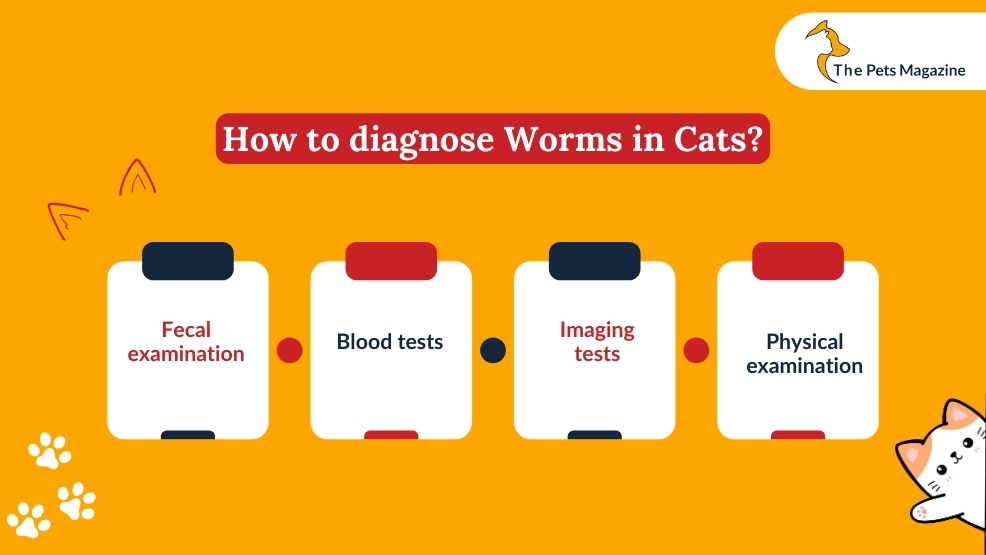
If you think your cat may have worms, it’s essential to seek professional veterinary assistance for an accurate diagnosis. Your veterinarian will likely perform one or more of the following tests:
Fecal examination: A microscopic examination of your cat’s feces can reveal the presence of worm eggs or larvae, helping identify the type of infestation.
Blood tests: Blood tests can detect heartworms or other parasites and assess your cat’s overall health status.
Imaging tests: In severe cases, your veterinarian may suggest getting imaging tests such as X-rays or ultrasounds to check for the presence of worms or any potential complications.
Physical examination: A thorough physical examination can help your veterinarian identify any visible signs of worms, such as skin lesions or a potbellied appearance.
It’s important to provide your veterinarian with a detailed history of your cat’s behavior, symptoms, and any potential exposure to sources of worm infestations. This information can aid in the diagnostic process and ensure appropriate treatment.
Treatment Options for Worms in Cats
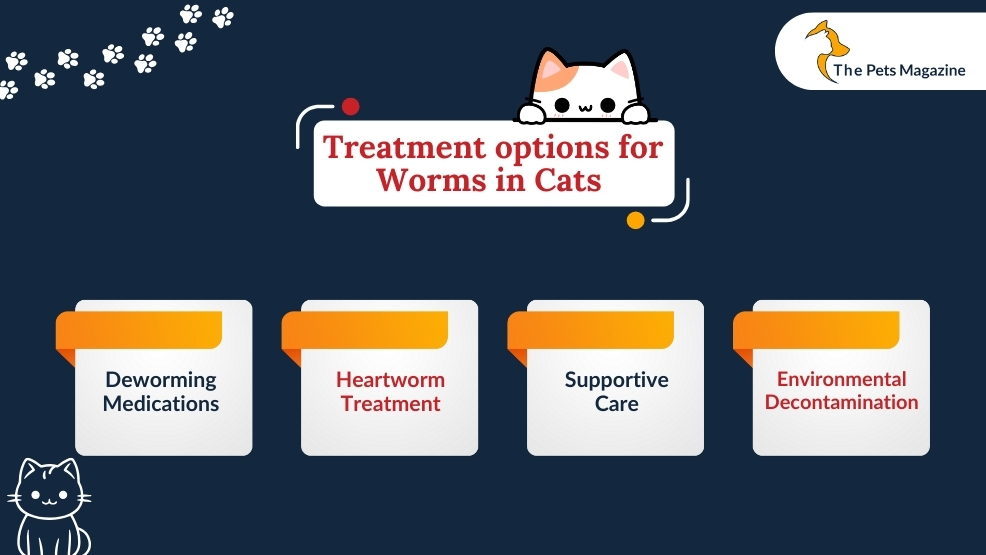
Once a worm infestation has been confirmed, your veterinarian will recommend the most suitable treatment option based on the worm type and the infestation’s severity. Here are some common treatment approaches:
Deworming medications: Oral or topical deworming medications are commonly prescribed to eliminate various types of worms. These medications work by paralyzing or killing the worms, allowing them to be expelled from your cat’s body.
Heartworm treatment: In the case of heartworm infestations, treatment can be more complex and may involve a combination of medications, including arsenic-based drugs to kill adult worms and corticosteroids to reduce inflammation.
Supportive care: Depending on the severity of the infestation and your cat’s overall health, your veterinarian may recommend supportive care measures such as fluid therapy, nutritional supplements, or medications to manage any secondary complications.
Environmental decontamination: To prevent reinfection, it’s crucial to thoroughly clean and disinfect your cat’s living environment, including bedding, litter boxes, and any areas where they spend time.
It’s important to follow your veterinarian’s instructions carefully and complete the full course of treatment to ensure the complete elimination of worms and prevent re-infestation.
Preventing Worms in Cats
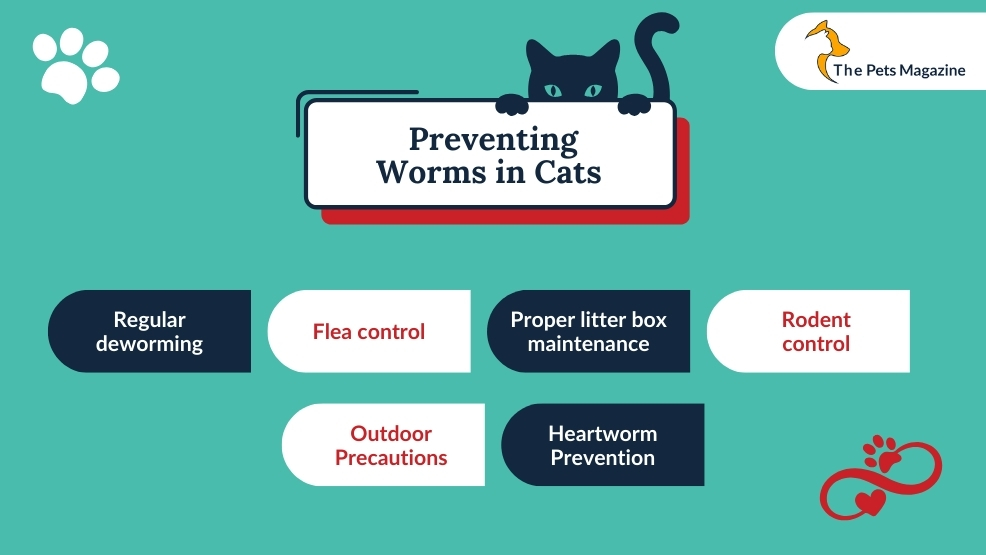
While treating worm infestations is essential, prevention is always the best approach. Here are some effective strategies to help keep your feline friend worm-free:
Regular deworming: Consult your veterinarian about an appropriate deworming schedule, especially for kittens and outdoor cats. Regular deworming can help prevent infestations before they occur.
Flea control: Many worms, such as tapeworms, are transmitted through fleas. Maintaining effective flea control measures can reduce the risk of worm infestations.
Proper litter box maintenance: Regular cleaning and disposal of litter can help prevent the spread of worm eggs or larvae.
Rodent control: Keeping your cat’s living environment free from rodents can reduce the risk of contracting worms by ingesting infected prey.
Outdoor precautions: If your cat spends time outdoors, consider limiting their access to areas where they may encounter infected soil, water, or prey on animals.
Heartworm prevention: Consult with your veterinarian about appropriate heartworm prevention measures, such as monthly medications or annual injections, especially in areas with a high prevalence of mosquitoes.
Implementing these preventive measures can significantly reduce the risk of worm infestations and protect your feline companion’s overall health and well-being. You should also take them to the vet for regular check-ups, so find out how often you should take a cat to the vet.
When to Consult a Veterinarian?
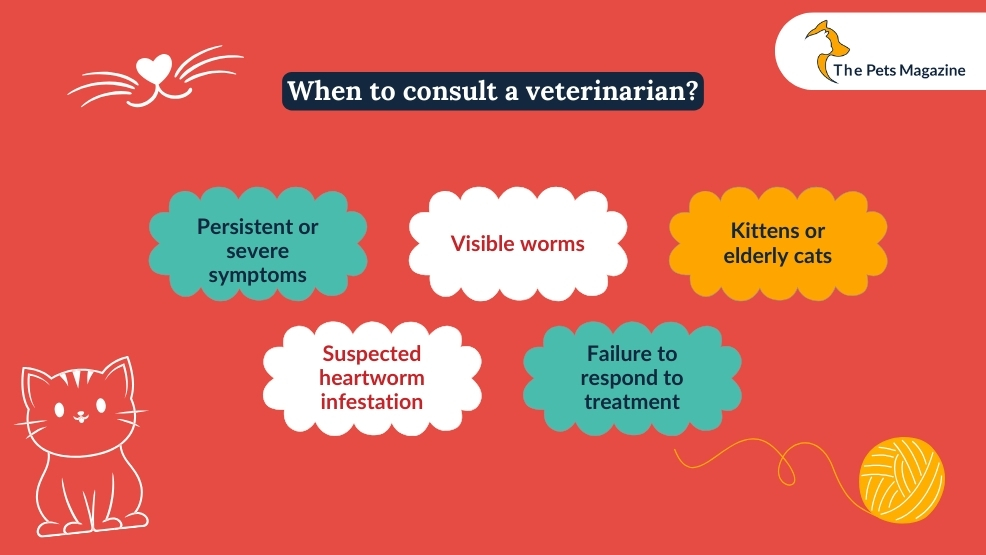
While some signs of worms in cats may seem mild or manageable, it’s crucial to seek professional veterinary assistance in the following situations:
Persistent or severe symptoms: If your cat exhibits persistent or severe symptoms such as prolonged diarrhea, significant weight loss, or respiratory distress, prompt veterinary attention is necessary.
Visible worms: If you notice worms in your cat’s feces, vomit, or around the anus, it’s essential to seek veterinary care for proper diagnosis and treatment.
Kittens or elderly cats: Worm infestations can be particularly harmful to kittens and senior cats, as their immune systems may be compromised. Early intervention is crucial in these cases.
Suspected heartworm infestation: If you suspect your cat may have heartworms, immediate veterinary care is essential, as this condition can be life-threatening if left untreated.
Failure to respond to treatment: If your cat’s symptoms persist or worsen despite initial treatment, consult your veterinarian for further evaluation and potential adjustments to the treatment plan.
Remember, prompt veterinary attention and accurate diagnosis are essential for effective treatment and preventing potential complications from worm infestations.
Final Thoughts
As a responsible cat owner, staying vigilant for the signs of worms in your feline friend is crucial for their overall health and well-being. By understanding the common types of worms, their associated symptoms, and appropriate treatment options, you can promptly address any infestations.
Remember, early detection and treatment are key to preventing further complications and ensuring your cat’s comfort and quality of life. If you notice any concerning signs or have any doubts, don’t hesitate to consult with your trusted veterinarian. Together, you can ensure your feline companion remains happy, healthy, and worm-free.
If you suspect your cat may have worms or have any concerns about their health, don’t hesitate to schedule an appointment with your veterinarian. Early detection and treatment are crucial for your feline friend’s well-being.









Leave A Comment